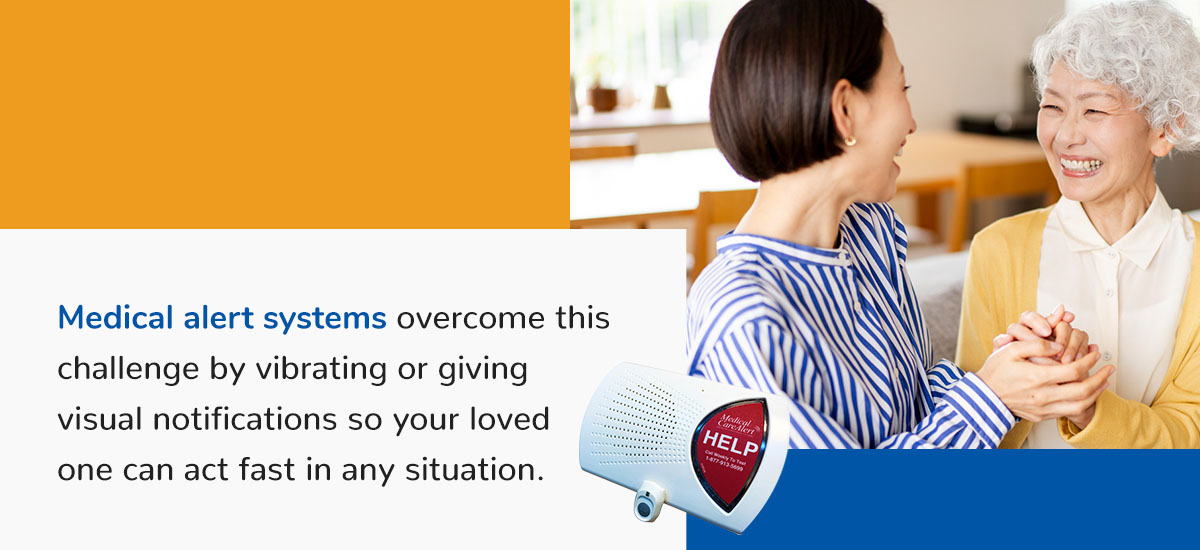Medical Alert Systems for the Deaf and Hearing Impaired
Nov 1st 2024
Medical Alert Systems for the Deaf and Hearing-Impaired
Many people benefit from personal emergency response systems (PERS) for hearing impairment. Studies find that 1 in 3 three adults over 65 has hearing loss. It can occur from genetics, exposure to loud noises, medical conditions or even medication. The risk of hearing difficulties, falls and injuries increases with age.
With a medical alert system, you can live more confidently with age. With the push of a button, your agent will send help during an emergency. Adding fall detection can promote even greater safety and peace of mind without needing to lift a finger.
Our article will discuss the benefits of medical alert systems for hard-of-hearing people, how to use them and how to choose the best one.
- Benefits of Medical Alert Systems for Hearing Loss
- How to Use a Medical Alert System When You Have Hearing Difficulties
- What to Look for in Medical Alert Systems for the Hearing Impaired
- Are There Medical Alert Systems Made for People With Hearing Loss?
Benefits of Medical Alert Systems for Hearing Loss
Hearing loss can have an immense impact on individuals and their family members. Often, people who are deaf or hard of hearing need medical alert systems. These systems can bridge communication gaps and ensure timely assistance. They can provide reassurance for your family, as you know your loved one will receive help as quickly as possible.
Whether you wear your device or install it at home, the devices can enhance independence and provide peace of mind. Benefits of personal emergency response systems (PERS) for hearing impairment include:
1. Immediate Access to Help
Medical alert systems offer quick help in an emergency — with just the press of a button. Mom and Dad can even wear them around their wrists, which is essential for the hard of hearing. They can offer assistance even when it's hard to hear alarms or calls for help.
2. Enhanced Safety
People with hearing impairments are at risk of missing sounds like smoke alarms or doorbells. At the same time, older adults face a higher chance of falls and injuries. It can be scary caring for someone with hearing loss for these reasons. Medical alert systems overcome this challenge by vibrating or giving visual notifications so your loved one can act fast in any situation.

3. Independence and Confidence
With a medical alert system, older adults with hearing loss can feel more independent and secure at home. Knowing that help is just a button press away can let them do their usual activities with confidence. Whether they are at home or out in the community, you have greater reassurance with this additional layer of security.
4. Customized Alerts
You can customize most medical alert systems with features for people with hearing loss. This might include text alerts and visual cues like flashing lights or vibrations. This ensures your loved one is notified in a way that works best for their hearing abilities.
5. Peace of Mind for Families
Family members understand how nerve-wracking it can be to have a loved one with hearing loss. You likely worry about their safety when you are away from them, especially if they cannot hear alarms. Medical alert systems provide reassurance, knowing that help is readily available. Peace of mind can lessen your worries, and your loved one can enjoy more independence.
6. Affordability and Accessibility
Technology advancements have made medical alert systems more affordable and accessible than ever. Many companies offer test trials, so you can try out the device before committing. This way, you can find a solution that fits your loved one's budget and needs.
How to Use a Medical Alert System When You Have Hearing Difficulties
While medical alert systems can accommodate the needs of people with hearing loss, you and your loved one should still take certain precautions. Some steps can minimize danger and the possibility of a false alarm due to their hearing difficulties:
- Get medical assistance: Ensure your doctor assesses their condition. They may recommend a hearing aid that can enhance safety.Medical alert systems will not interfere with your loved one's hearing aids.
- Wear at all times: If using a wearable medical alert device, wear it whenever possible. Many devices are waterproof, so they can be worn in the tub or shower. Make a habit of at least keeping it within reach at all times, whether at home or outdoors.
- Familiarize yourself with the device: When you receive your device, practice activating it. Familiarize yourself with the alert signals and features, whether it has vibrating alerts, flashing lights or visual notifications. Regularly test it to ensure it works correctly and keep it charged.
What to Look for in Medical Alert Systems for the Hearing Impaired
If your loved one is struggling with hearing difficulties or visual impairments, consider these factors when picking out a medical alert system:
Ease of Use
Hearing loss can make everyday tasks more challenging, especially for older adults at fall risk. Choose a medical alert device that is easy to use, regardless of hearing abilities.
Features for Hearing Loss
Choose a device with valuable features for hearing loss. These might include loud or adjustable speakers, visual alerts and nonverbal protocol.
Price
Look for a budget-friendly option that offers excellent value. Note that any features you add may require an additional monthly subscription fee but can be critical for anyone with hearing challenges.
Fall Detection
Hearing loss can increase your risk of falling. You might opt for a wearable device with fall detection, which can notify emergency services without pressing a button.
Operator Training
Choose a medical alert company with a highly trained response operator team. Agents should be trained to communicate with people with hearing loss and know how to send help.
Are There Medical Alert Systems Made for People With Hearing Loss?
There are not medical alert systems made specifically for those with hearing loss. However, the devices at Medical Care Alert are designed with specific consideration for the deaf and hearing-impaired. Our devices work in the following ways:
- Medical history account: Our operators are notified about your loved one's hearing condition and specific needs. This ensures the best communication. We can also relay medical history to emergency medical services if we dispatch help.
- Communication protocol: If we cannot hear your family member's voice after an emergency alert, we attempt to call them. If requested, we will reach out to a designated neighbor or family member before dispatching help.
- Alert features: The smartwatch and HOME & AWAY devices feature a vibration alert so that your loved one knows if the device has been activated. We can also set up direct contact with family members before dispatching emergency services.
Contact Us for a Quality Medical Alert System
Older adults with hearing loss can enjoy a sense of freedom and confidence when using a medical alert system. At Medical Care Alert, we offer in-home and wearable medical alert devices. Many come with GPS and optional fall detection for enhanced safety, and support for the deaf and hearing-impaired is available.
Our operators are professional yet personal, responding with sensitivity and patience when your loved one needs help. Contact us today, and we can help you find the best medical alert system for your family.
Free Brochure
By Mail
Or call us at
855-272-1010



